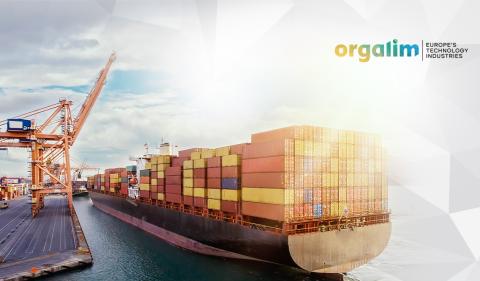Orgalim Presidents’ Board statement on resilience of industrial supply chains
12 October 2021

Today, Orgalim Presidents’ Board - composed of leading European industrialists representing Europe’s technology industries - issued a Statement regarding industrial supply chains. The statement emphasises the key importance of global supply chains and export markets for our industries, and sets out our recommendations to policy makers to support the resilience of industrial supply chains.
Read the full statement hereafter.
Orgalim Presidents’ Board statement
Resilience of industrial supply chains

We are leading European industrialists representing Europe’s technology industries: highly innovative and strongly export-oriented technology manufacturers, most of them midcaps and SMEs, across the ICT, electronics, electrical engineering, machinery and metal technology sectors. The member companies which our associations represent are key enablers of the digital and climate transitions across all sectors, directly employing 11.33 million people in high-value future-facing jobs, and manufacturing one-third of all European exports.
Access to global supply chains and export markets is key to our success. We believe that open, rules-based free trade remains a prerequisite for Europe’s industrial prowess, and our industry would suffer disproportionately if global supply chains were to break down. As the geopolitical dynamics shift rapidly, standing up for the global trading order also means Europe needs to be less naïve in its relationship with other major markets and must be more focused on levelling the playing field, including tackling illegal foreign subsidies, fighting against non-compliant and counterfeited products, and opening third-countries’ public procurement markets.
Our industries have learned the lesson from the COVID-19 crisis. Despite severe disruptions due to unprecedented regulatory interventions, we were able rapidly to adapt our supply chains, allowing an energetic recovery. The main obstacle we face to an even faster and broader recovery are the continuing bottlenecks in certain areas, such as microchips and other electrical components, steel and aluminium; as well as in transport and logistics. We call on all parts of Europe’s industrial ecosystems to work together on addressing these bottlenecks as soon as possible.
While the challenges are real, we consider this as primarily an issue for industry to resolve, and we caution against the political temptation to interfere. Import substitution initiatives risk shifting the economy into sectors where Europe does not enjoy a comparative advantage, distorting competition on the single market and undermining our global competitiveness. Our industries support Europe’s leadership in global sustainability efforts, but we are deeply concerned about the introduction of ill-designed due diligence and reporting obligations for supply chains. These would penalise the hundreds of thousands of smaller technology manufacturers at the heart of Europe’s industry, with their highly specialised business models that are embedded in complex and diversified global value chains. Any future EU due diligence requirements must fully recognise these companies’ distinct competitiveness drivers.
We recognise the role the EU can play to support greater resilience in semiconductor supply chains. We particularly welcome the EU-US Trade and Technology Council’s objective to coordinate approaches and capture all possible synergies in the massive investments that will be made on both sides of the Atlantic. To ensure effective use of taxpayer money it is critical that these public investments are tailored to the needs and priorities of Europe’s industries. Representing both the semiconductor ecosystem itself as well as a major “user industry” for microchips, we confirm our willingness to work with the Commission on these efforts.
***

LATEST NEWS
How can we create a dynamic, competitive European high-tech manufacturing base?
Orgalim's key recommendations offer policymake...
